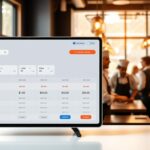
Top 10 Wholesale Restaurant Suppliers Compared for 2026
July 29, 2025
Ultimate Guide to Restaurant Scheduling Software Pricing and ROI
July 30, 2025As a restaurant owner, I’ve seen firsthand how tough it is to compete with big chains in Google search results. Almost 77% of people visit a restaurant’s website before ordering or visiting, and a poor site experience often loses their business.
To attract new diners, your digital presence should be strongly optimized for potential customers and search engines. The playing field has become more level thanks to local search algorithms that favor proximity and relevance over brand size.
Discover the hidden strategies that can help your restaurant outrank the competition and thrive in today’s digital landscape.
Key Takeaways
- Optimize your website for local search to increase visibility.
- Use relevant content to attract potential customers.
- Leverage online presence to stay ahead of the competition.
- Improve your website’s user experience to retain visitors.
- Utilize search engine optimization techniques to boost your ranking.
Why Small Restaurant SEO Strategies Matter in Today’s Digital Landscape
The way consumers discover restaurants has fundamentally shifted, making SEO strategies vital for small eateries. Today, people primarily use search engines to find places to eat, rather than relying on traditional advertising.
The David vs. Goliath Battle in Restaurant Search Rankings
Big restaurant chains typically dominate through brand recognition and substantial marketing budgets. However, they often have weaknesses in local relevance. As Google’s local search algorithms favor small restaurants that properly optimize their online presence, these smaller businesses can outrank bigger brands with generic content. “The local search landscape has changed dramatically, allowing small restaurants to compete effectively,” as noted by industry experts.
How Local Search Gives Small Restaurants a Competitive Edge
Local search results mean that small restaurants only need to compete in their geographic area, not nationally. This personalized approach to search results gives small restaurants a significant competitive edge. By focusing on local SEO, small restaurants can capitalize on “micro-moments” in restaurant searches, where consumers are making decisions about where to eat.
With the pandemic having permanently changed consumer search behavior regarding restaurants, making online visibility more important than ever, small restaurants must prioritize their SEO strategy to remain competitive.
Strategy #1: Dominate Google Business Profile with Strategic Optimization
Dominating Google Business Profile is a crucial step for small restaurants to improve their local search visibility. By claiming and optimizing their Google Business Profile, small restaurants can widen their online presence and attract more customers.

Essential Profile Elements That Boost Local Visibility
To maximize local search visibility, small restaurants need to focus on essential profile elements. This includes accurately categorizing your business, listing relevant attributes, and defining your service areas. When building out your business description, it’s crucial to incorporate keywords from your previous research without appearing spammy.
Key elements to focus on:
- Business categories and attributes
- Service areas and locations served
- Crafting a compelling business description with relevant keywords
Advanced GBP Features Most Small Restaurants Overlook
Beyond the basics, there are advanced Google Business Profile features that can give small restaurants an edge. These include adding products or services, utilizing the Q&A section, and posting regular updates. Optimizing business hours for holidays and events is also crucial, as is adding geo-tagged photos to enhance local search visibility.
Advanced features to leverage:
- Products or services offered
- Q&A section for customer engagement
- Google Posts for promotions and updates
- Optimized business hours
- Geo-tagged photos
By focusing on these essential and advanced features, small restaurants can significantly improve their local search visibility and attract more customers.
Strategy #2: Leverage the Power of Customer Reviews for Ranking Dominance

Reviews are the lifeblood of local SEO, and leveraging them is key to outranking bigger brands. Almost everyone reads reviews before choosing a new restaurant, making them a top priority for local visibility. The quality and quantity of reviews directly impact a restaurant’s search rankings.
Ethical Ways to Encourage More Positive Reviews
To encourage more positive reviews, it’s essential to directly ask customers while they’re still in the restaurant. Training staff to ask for reviews at the right moment can significantly boost the number of reviews. Creating QR codes that link directly to review platforms can also make the process frictionless for customers.
Ethical strategies I’ve used include providing excellent customer service and ensuring that customers have a positive experience. This can be achieved by focusing on the quality of food, service, and overall ambiance.
Responding to Reviews to Maximize SEO Benefits
Responding to both positive and negative reviews is crucial for maximizing SEO benefits and maintaining customer goodwill. When responding, it’s essential to incorporate keywords naturally without appearing forced or spammy. This not only improves SEO but also shows customers that their feedback is valued.
By analyzing review content, restaurants can gain actionable insights to improve operations and SEO strategy. Monitoring and managing online reputation across multiple review platforms is also vital.
Strategy #3: Create Hyper-Local Content That Big Chains Can’t Replicate
Creating content that resonates with the local community is a game-changer for small eateries. By focusing on hyper-local content, small restaurants can establish a strong online presence that bigger chains struggle to match.

Neighborhood-Specific Content Strategies
To effectively implement hyper-local content, small restaurants should start by developing neighborhood-specific content strategies. This involves creating content that is tailored to the local audience, such as neighborhood guides, local ingredient spotlights, and community stories. For instance, a restaurant could publish a blog post on “The Best Kept Secrets in [Neighborhood Name]” or “How Local Ingredients Enhance Our Menu.” By doing so, the restaurant not only improves its local SEO but also builds a connection with the community.
Another effective strategy is to create neighborhood-specific landing pages. These pages should target local keywords without appearing duplicative to search engines. For example, a restaurant with multiple locations could have a dedicated page for each neighborhood it serves, highlighting the unique aspects of its presence in that area.
Local Events and Community Tie-ins That Boost Rankings
Incorporating local events and community tie-ins is another powerful way to boost rankings. Restaurants can achieve this by sponsoring local events, partnering with local suppliers, or even hosting their own events. By promoting these activities on their website, restaurants can generate both backlinks and local relevance signals. For example, a restaurant could host a “Taste of [Neighborhood]” event and feature local artisans and farmers, then write about the event on their blog.
To maximize the SEO impact, it’s essential to maintain a consistent publishing schedule. Using a content calendar template specifically designed for small restaurants can help achieve this. Additionally, repurposing content across multiple channels can minimize the creation workload while maximizing its reach and impact.
As noted by SEO experts, “Local content is king when it comes to attracting nearby customers.” By focusing on hyper-local content, small restaurants can not only improve their search rankings but also build a loyal customer base.
“The key to successful local SEO is creating content that resonates with your local audience. It’s about being relevant, being local, and being consistent.” –
Strategy #4: Implement Technical SEO Tactics for Faster Results
Faster results are possible for small restaurants when they prioritize technical SEO, making their websites more search engine friendly. Technical SEO makes it easier for search engines to crawl, index, and rank your website’s content, and it also significantly improves user experience.

To perform well online and not frustrate potential customers, your site should prioritize Google’s core web vitals, especially page speed. If pages take too long to load, people will likely lose interest and navigate away from your site, increasing your bounce rate—a negative signal to search engines.
Mobile Optimization Essentials for Restaurant Websites
Mobile optimization is crucial for restaurant websites. Ensuring that your site is mobile-friendly involves making sure it loads quickly on mobile devices, has touch-friendly menus, and includes features like click-to-call functionality and map integration. These elements not only improve user experience but also contribute to better SEO.
Schema Markup and Structured Data for Restaurants
Implementing schema markup and structured data helps search engines understand your restaurant’s menu items, prices, hours, and special offerings. This can lead to your restaurant appearing in rich snippets and knowledge panels, dramatically increasing visibility and click-through rates.
By focusing on technical SEO, including mobile optimization and schema markup, small restaurants can achieve faster results and improve their online presence. This involves optimizing page speed, ensuring mobile-friendliness, and using structured data to enhance search engine understanding of your site.
Strategy #5: Build a Network of Local Citations and Backlinks

Building a strong network of local citations and backlinks is crucial for small restaurants to outrank big brands in local search results. Beyond Google, ensuring your restaurant is listed in relevant local directories can significantly improve your online visibility and create valuable backlinks to your website.
Restaurant-Specific Directories That Drive Traffic
When it comes to local citation building, not all directories are created equal. Restaurant-specific platforms like Yelp, TripAdvisor, and Zomato are particularly effective at driving qualified traffic to your website. These industry-specific directories help potential customers find your restaurant when searching for dining options in your area.
To maximize your reach, it’s essential to list your restaurant in both free and paid directories. Some of the top restaurant-specific directories include:
- Yelp
- TripAdvisor
- Zomato
- OpenTable
- Google My Business
Creative Local Link Building Tactics
While directories are a crucial starting point, creative local link building tactics can further enhance your online presence. Consider community sponsorships, local media outreach, and partnerships with local suppliers to generate high-quality backlinks.
Leveraging local food bloggers, influencers, and reviewers can also be an effective strategy. By hosting events or offering complimentary meals, you can encourage these influencers to link back to your website, thereby improving your search engine rankings.
To ensure the success of your local citation and link building efforts, maintaining NAP (Name, Address, Phone) consistency across all citations is crucial. Inconsistencies can confuse search engines and negatively impact your local search rankings.
Strategy #6: Keyword Research Secrets for Small Restaurant SEO Strategies
Keyword research holds the secret to helping small restaurants outshine bigger competitors in the digital landscape. By understanding what phrases potential customers use when searching for dining options online, small restaurants can tailor their website content to match these searches, thereby improving their visibility in search engine results.
Finding Low-Competition, High-Intent Keywords
Identifying the right keywords is crucial for small restaurant SEO. I recommend using free SEO tools like Mangools’ KWFinder or Google Keyword Planner to analyze what keywords competitors are ranking for. Focus on non-branded, local keywords that people use to search for restaurants in your area. For instance, instead of targeting broad terms like “best Italian restaurant,” target more specific phrases like “Italian restaurant in [neighborhood name].” This approach helps in capturing high-intent searches with lower competition.
To further refine your keyword strategy, it’s essential to understand the difference between informational, navigational, and transactional keywords. Transactional keywords, such as “order pizza online” or “book a table,” are particularly valuable for restaurants as they indicate a clear intent to engage with the business.
Strategic Keyword Placement on Restaurant Websites
Once you’ve identified your target keywords, the next step is to place them strategically on your website. This includes optimizing page titles, meta descriptions, headings, and body content. For example, if you’ve identified “best breakfast in [city name]” as a target keyword, ensure that it appears in your page title, such as “Best Breakfast in [City Name] – [Restaurant Name].”
Optimal keyword density is another critical factor. Aim for a natural integration of keywords without overdoing it. A density of about 1-2% is generally considered safe. Additionally, leveraging Google’s “People Also Ask” and “Related Searches” features can provide valuable insights into related keyword opportunities that can be incorporated into your content.
By implementing these keyword research secrets, small restaurants can significantly enhance their SEO strategy, driving more targeted traffic to their website and ultimately, more customers through their doors.
Measuring Success: Key Metrics to Track Your Restaurant’s SEO Progress
Understanding how to measure SEO success is critical for small restaurant owners who want to maximize their online visibility and drive more customers to their business.

To evaluate the effectiveness of your restaurant SEO strategy, you need to track a combination of search visibility metrics and business outcome metrics. This includes monitoring your website’s backlinks, bounce rate, click-through rate, conversion rate, engagement, impressions, and keyword rankings.
Essential Tools for Monitoring Local Search Performance
To track these metrics effectively, you’ll need to use essential tools like Google Analytics and Google Search Console. These tools provide valuable insights into your website’s performance, helping you identify areas for improvement and optimize your SEO strategy.
Some key features to look for in SEO analytics tools include:
- Keyword ranking tracking: Monitor your restaurant’s position in search results for target keywords.
- Local search visibility: Track your visibility in local search results, including Google Maps.
- Website traffic analysis: Understand how users are interacting with your website.
Understanding Analytics to Refine Your Strategy
Once you have the right tools in place, it’s essential to understand how to interpret the data and refine your SEO strategy accordingly. This involves analyzing your metrics to identify trends, opportunities, and challenges, and adjusting your strategy to improve your online visibility and drive more customers to your restaurant.
By regularly reviewing your analytics data and making data-driven decisions, you can continually refine your SEO strategy and achieve better results over time.
Conclusion: Implementing Your Small Restaurant SEO Game Plan
By leveraging these powerful SEO strategies, your small restaurant can attract more customers and boost reservations. To start, focus on optimizing your restaurant website with relevant content and technical fundamentals.
Make sure your Google Business Profile is complete and up-to-date, as this is crucial for local search visibility. Don’t forget to encourage your customers to leave reviews on your profile, as this will improve your rankings in search results.
To further enhance your online presence, utilize social media platforms to drive traffic to your website. You can also use local directories to boost your visibility in search results. By implementing these strategies, you’ll be able to measure your success and refine your approach using analytics tools.
Remember, SEO is an ongoing process that requires consistent attention. Start small, measure your results, and gradually expand your efforts as you gain confidence and see positive outcomes. With the right strategy and a bit of patience, your small restaurant can outshine big brands in Google search results.
Now it’s time to take action and make sure your restaurant is visible to potential customers. By following these steps and staying committed to your SEO efforts, you’ll be on your way to increasing your online presence and driving more sales.
FAQ
How do I optimize my Google Business Profile for better visibility?
To optimize your Google Business Profile, ensure you have a complete and accurate profile, including a profile picture, cover photo, business hours, and a detailed business description. I also recommend responding promptly to customer reviews and using relevant keywords in your profile.
What is the importance of customer reviews for my restaurant’s online presence?
Customer reviews play a crucial role in your restaurant’s online presence, as they not only improve your visibility in search results but also influence potential customers’ decisions. I encourage you to respond to all reviews, both positive and negative, to show your commitment to customer satisfaction.
How can I create hyper-local content that attracts local customers?
To create hyper-local content, focus on your neighborhood and community. I suggest writing about local events, partnering with other local businesses, and highlighting your restaurant’s involvement in the community. This type of content will help you attract local customers and improve your search rankings.
What technical SEO tactics can I implement to improve my restaurant’s website?
To improve your restaurant’s website, I recommend implementing mobile optimization, schema markup, and structured data. These technical SEO tactics will help your website load faster, be more user-friendly, and provide search engines with additional context about your business.
How can I build a network of local citations and backlinks for my restaurant?
To build a network of local citations and backlinks, I suggest listing your restaurant in relevant directories, such as Yelp and TripAdvisor, and partnering with other local businesses to create content and link back to your website. You can also participate in local events and sponsor local charities to increase your online presence.
What are some essential tools for monitoring my restaurant’s local search performance?
To monitor your restaurant’s local search performance, I recommend using tools like Google Search Console, Google Analytics, and Ahrefs. These tools will help you track your website’s traffic, search rankings, and online presence, allowing you to refine your SEO strategy and improve your results.
How often should I update my restaurant’s website and online presence?
I recommend regularly updating your restaurant’s website and online presence to keep your content fresh and relevant. This includes updating your menu, hours of operation, and promotions, as well as posting new content on your blog and social media channels.



